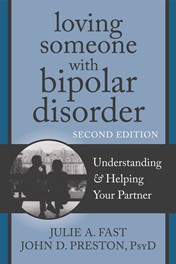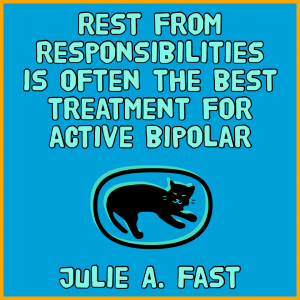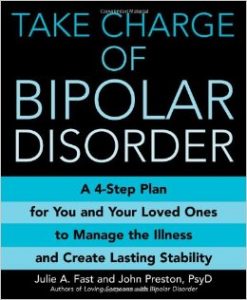
We can start this year and create a holiday plan that serves us for years to come. Let’s focus on what we need and how we want to feel during every holiday season. It’s possible to have stable and joyful holidays when you have bipolar disorder. (This plan works for family members and partners as well. You simply become the observer and come up with a plan that works for you.)
What do you want to happen this holiday season? Do you need less hustle and bustle or more contact with people? Now is a good time to look back on past holidays and think ahead to the next few weeks of the festive season as you create your plan.
Think back to what worked in the past and what didn’t work? This helps you get clear on what is related to bipolar in general and what is circumstantial.
- Who makes you happy?
- Who drains you?
- What have others said about your own behavior that you can change?
- Where do you want to be for the holidays?
- What is the financial plan for the holiday season?
Knowing this information helps you focus on what you can and can’t change starting this year.
Once you examine what worked and didn’t work for you in the past, make a list of what needs to change and make this the year you get started on creating a holiday experience that promotes stability. Make this your year of observation instead of trying to make big changes all at once.
Change isn’t always easy. Others might be confused or upset at what you need to do in order to be stable, but if you’re clear on what you need and you clearly share why you’re making certain decisions, you can find a balance between stability and still being a part of the festive season.
Julie’s Story
As a person with bipolar, it’s easy for me to get overwhelmed and upset by too much activity and yet, if I’m not a part of the social aspect of the holidays, I tend to get lonely and depressed. It’s a vicious circle that takes a lot of thinking and planning to organize every year. I’ve had SO many bad holiday experiences that were due to my bipolar. It’s frustrating to never get a holiday from this illness, but I have learned to plan ahead and make my holidays as stable as possible.
Over 25 years ago, I decided to change my holiday experience and even today, I’m modifying what works and what doesn’t work for me during the holiday season.
A Big Change: Buying and Giving Presents During the Holidays
My first decision to change my holiday life made the biggest difference. I decided to stop giving presents to everyone in my life and asked that no one give me presents. I made it clear I would still buy presents for children, but in terms of my friends and family, I opted out. This is a bit more common now, but when I did this in the mid 90s, it was definitely different! My reasoning? I was spending money I didn’t have and receiving gifts I didn’t need. I remember sitting on a couch one year surrounded by presents that were nice and thoughtful, but did I need them? No. It was just too much. And I had spent weeks trolling the stores trying to find gifts for the people in my life. I spent more money than I wanted to and ended up buying stuff that no one needed. I found all of the buying stressful.
When did buying an excessive amount of presents become a necessity for the holidays? That was my first question. Why should a person spend money on presents when the money is needed for personal survival? Is it a present if it’s bought on credit? All of this went through my head and I just one day said, “No more.”
It changed everything. At first, I took my no present plan too far and felt left out during secret Santa and elephant gift exchange, so I modified my plan over the years. I now participate in small gift giving. Times are different now and not buying everyone a present is the norm. It wasn’t always like this!
When my nephew was born, I definitely had a great time buying him holiday gifts, but I kept it simple and he knew my plan. I explained that my attention would come from dinners together, movies and having fun all over our city, but it would not be expressed in extra presents. This helped my bipolar disorder greatly.
How to Stick to a Holiday Plan when Kids are Involved
I just called my nephew David who is now 20 and asked what he remembered. “You were really open about it. You said that shopping was stressful for you and the bipolar and that I would get one present and everything else would be hanging out and having sushi. You said that presents felt like a big task. It didn’t bother me. We always did a lot of stuff together anyway.”
I then asked him about his friend group and how Gen Z handle the holidays. “Not everyone has money to buy presents for each person, so we just buy a few then have a big party at my house where there’s food and a lot of games and hanging out with each other. We keep the presents simple and if someone doesn’t have a present, my mom always has one ready. The party is the present.”
Interesting. I wonder if my plan actually helped David step away from the excessive gift giving that can cause stress if money or mood are a problem. Please note that I’m simply talking about my own holiday experience… you might be different.
But Julie! I like giving presents! I want to get presents!
Please know that I’m NOT telling you to stop giving presents. Instead, I’m suggesting that you examine what makes you happy during the holidays and what drains you emotionally and financially. Then change what you can. For myself, it is was presents and cooking holiday meals. It might be something different for you! I’m using myself as an example. What you decide to change depends on your circumstances. I want to teach you a system that can be used in any situation to make the holidays more stable. Here are three changes you can make to create more stable and joyful holidays.
- Say no when you need to and create a script you can use when you say no.
- Say yes when it’s in your best interest. Focus on socializing instead of isolating.
- Be ready for pushback and ask for support from those who understand your desire to be stable.
1. Saying NO: Depending on your situation, you might have to get comfortable with saying no to people who ask a lot of you during the holidays. I have an example of this in Getting it Done When You’re Depressed. A person is asked to bring their ‘excellent food’ to the company party. It’s a lot of work and every year it creates frustration and a lack of joy during the party itself. In the example, the person anticipates being asked to bring food and has a script ready that kindly says NO. (A script in this case is a kind and firm response you create in anticipation of being asked to do something you don’t want to do.) Here is an example: “We would just love it if you would bring the cookies for the holiday party this year! You’re such a good baker!”
And a scripted response…
“Thank you so much for complimenting my food. I’m glad people enjoy it. I’m not cooking this year, but I will definitely be at the party. I can bring drinks.”
Getting it Done When You’re Depressed is a good place to start if you need strategies for making it through the holidays while you’re getting help for depression.
I promise that it gets easier each time you say no without overly explaining your reason why unless you want to explain why! You don’t own anyone an explanation. You can be kind about it, but you can also be firm. This is about your health. It’s not selfishness or unkindness to search for stability.
What about going up against the ‘family tradition’ where you’re expected to do a lot during the holidays? How do you get out of these situations without making people angry? Well, sometimes you can’t do this without upsetting a few people, but over time, families understand. The goal is to explain that the reason you’re making the change is for your health and not due to any problems in the relationship.
Having a script ready for certain situations definitely helps:
Here are a few examples:
We know how much you love cooking. Your holiday dinners are legend! We would love to do dinner at your house this year!
Script: Oh, thanks so much for letting me know how much you like my food! I have had a lot of fun in the past making dinners for everyone. I decided to stop doing this as I want to just enjoy everyone’s company. I would love to meet you somewhere for dinner, so just let me know what works for you!
The goal is to say what you need without making it about the other person. Make it all about you and your needs in a way that is supportive and loving, but very, very firm.
Practice really does make a difference when it comes to saying no.
Here is another example:
We want to do an office party this year and need someone to coordinate the secret gift program. Can I put you down for this? You’re so good at organizing.
Script: Thank you for thinking of me. I am not able to do this project this year. I would love to do something to help that doesn’t involve coordination.
You might notice that I acknowledge the offer in a kind way and then say no without giving someone any wiggle room.
Saying no is so much easier now than in the past. You can learn to say no without causing stress to yourself or others.
Maybe it’s different for you and you actually need to say yes more!
2. Saying YES: What about saying yes if you tend to say no too much and then end up lonely on the holidays? This year, choose an event that you normally say no to and say yes this time. The only goal is saying yes and going. You can then relax when you get there as you have already made the change needed. Nothing else has to happen except turning up. The less pressure you put on yourself to have a good time, the better.
Ask yourself,
- “Do I really want to be alone this year?”
- “Do I need to be with people?”
- “What are my options? What can I set up now?”
Once you choose something, make a pact with yourself that you WILL SAY YES no matter what and then go to the event whether it is in person or online. That is the only goal. It will get easier each time you do this. Here are my articles on avoiding isolation. These strategies help at any time of the year, but are especially important during the holidays.
The End of Bipolar Depression Isolation
Ending Bipolar Depression Isolation
It’s so important that we don’t let bipolar make our decisions for us. Think now of what you want. Think of where you want and need to be during the holidays that you celebrate.
Life online means that you CAN be with others all over the world no matter what is happening in your life.
And finally… make this year about transitioning into holidays that work for you……
3. Be ready for pushback: I remember when a few of my friends also decided to stop giving presets to everyone and instead toned it all down with just a few present exchanges or gifts for children. One friend told me her in law actually said, “Do you hate your family! Are you trying to punish us!?”
This is the pushback that you might face. You’re smart enough to think about this ahead of time and figure out who might be the one who doesn’t want you to change. This is the person you talk to first and share why you’re making changes- it’s for your health. We don’t control the behavior of others, but we can plan ahead for potential push back.
Ultimately, the holidays are about you and your bipolar stability.
Is this helpful? Do you need to say no more or yes more? Are you thinking ahead of where you want to be on specific dates and who you want and need to be with?
You’re the one who experiences the holidays. You’re the one who needs to be stable to handle all of the stress and expectations during this time. My goal is to give you a few options that might work, but ultimately, I want you to think now of what you need in the next few weeks. This year it can be different. You can decide what you need and figure out what you want for your future holidays as well.
I will be here during the holidays. Join me on my JulieFast Instagram page for support and love during the festive season.
Julie
Julie A. Fast is the author of Loving Someone with Bipolar Disorder, Take Charge of Bipolar Disorder, Getting it Done When You’re Depressed and OMG! That’s Me! Vol. 2.













